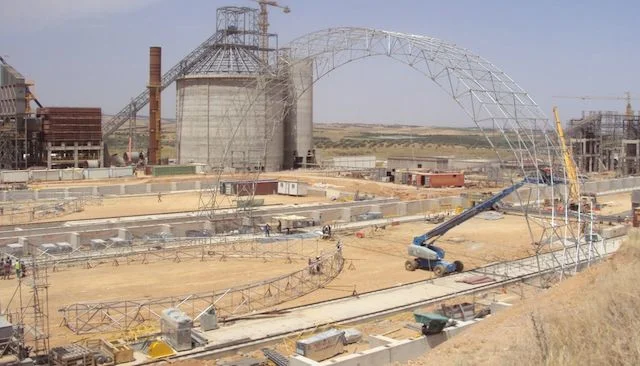Green Cement at the Foot of the Mountain
Environmental responsibility in an industrial setting
In Arabic, the name Djebel Ressas means “mountain of lead,” a reference to the ore that has been mined near this 800m peak in Tunisia since antiquity. To this day, the region near this mountain continues to be a rich source of construction materials. The industrial role of the mountain, however, must coexist with its status as a nature preserve, host to olive orchards and small herds of domestic livestock. In addition, the nearby town of Mornag has become the capital of a flourishing wine-producing region, with its own environmental concerns.
This dichotomous environment—both industrial and agricultural—is just the spot for Geometrica structures, which promote beauty and environmental responsibility in industrial settings.
Tunisia’s largest and most technologically advanced cement plant
Geometrica supplied three bulk-storage structures for Carthage Cement's new plant in Djebel Ressas. The plant began to take shape in late 2010 and was completed in 2013. Designed to produce 5,800 tons of cement per day, it is now Tunisia’s largest and most technologically advanced cement plant.
“We have paid particular attention to adopting the latest technology, high economy of energy consumption and great respect for the environment,” said Lazhar Sta, CEO of Carthage Cement.
To complete the plant, Carthage Cement entrusted FLSmidth (FLS), a global engineering company based in Copenhagen, to supply machinery and engineering. Turkish contractor, EKON, was FLS's partner for the civil works, including civil design, supply of structural steel and plate work, site preparation, plant erection. The civil work compares in scale to that required to build an entire town.
"We learned about Geometrica through an international cement trade magazine and the Internet," said EKON Project Manager, A. Cem Sevük. "We chose Geometrica because, compared to their competitors, they gave us a better price and speedier delivery."
Quality, efficiency and safety
Geometrica supplied three storage buildings: for additives, coal and limestone. The additives and coal longitudinal buildings are 200m and 300m long, respectively, and similar in span (50m). The limestone building is a 90m circular dome.
All domes were reinforced with arch ribs. “We assembled the domes in half-arch segments on the ground. Then we lifted the arches into place, and stitched them to the growing structure. This minimized the amount of time workers had to spend working at heights,” said Fernando Gracia, Geometrica's lead engineer for the project. “Oval hubs in the bottom chord of the domes' ribs allowed us to use two rectangular bars in parallel, reducing the overall arch count, and increasing structural efficiency.” Gracia explained.
"Their structures are light and easy to install--like Lego®!," said Sevük. "Because the components are so light--and are packaged so efficiently--we saved money on transportation as well. Those savings in time and money, combined with their cooperative and professional approach, confirmed that we'd made the right decision in choosing Geometrica."
Green success
Geometrica's bulk storage structures contain the dust from stacking and blending of raw materials and fuel, helping meet the plants environmental goals. "The new buildings are, esthetically, very nice, and we definitely will consider Geometrica for future structures," Sevük said.
The new plant created over 400 direct jobs and now supplies cement to Tunis, the national capital and source of 50 percent of Tunisia's cement demand. The environment near the "lead mountain", including its orchards, livestock and nature preserve, are protected, and Carthage Cement helps Tunisia continue on its growth path.









